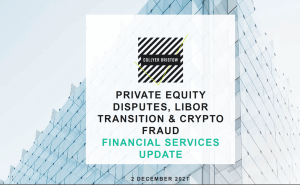- FinTech
- Financial regulatory
- Financial services
- Financial services

Shorter Reads
US Office of Foreign Assets Control uses blockchain technology to surveil entities behind cryptocurrency activities
US Office of Foreign Assets Control makes use of blockchain surveillance technology to understand the real-world entities behind cryptocurrency activities
1 minute read
Published 28 June 2021
Key information
The Office of Foreign Assets Control (OFAC) is subscribing to use blockchain surveillance tools developed by New York headquartered firm, Chainalysis.
OFAC is responsible for administering and enforcing economic sanctions in the United States, based on foreign policy and national security objectives.
OFAC has indicated that it will make use of Chainalysis’ technology, which helps government agencies and financial institutions to understand the real-world entities behind cryptocurrency activities.
OFAC says that it “requires a commercial online blockchain tracing web-based application tool to equip investigators in its Office of Global Targeting (OGT) to analyze and track virtual currency transactions e.g. Bitcoin, in order to gather attribution information on involved parties that OGT may put on the [Specially Designated Nationals and Blocked Persons] List.”
Although persons transacting in cryptocurrencies can sometimes remain anonymous, every single transaction is recorded on a tamper-proof public blockchain ledger. One can therefore be entirely certain about the origination and transaction history of any particular wallet and where the cryptocurrency in that wallet came from. If the wallet is linked to a regulated exchange that conducts rigorous anti-money laundering due diligence, then it may also be possible to identify the real-world entity that sits behind it.
Even so, in the context of sanctions regulations, the pseudo-anonymity of crypto dealings will continue to cause headaches for firms who transact in digital currencies or offer payment processing services.
Earlier this year, BitPay paid over $500,000 to settle its potential civil liability for 2,102 apparent violations of multiple US sanctions programs. The firm, based in Atlanta, Georgia, had developed a payment processing solution for merchants to accept digital currency as payment for goods and services. OFAC’s investigations uncovered that persons in Crimea, Cuba, North Korea, Iran, Sudan, and Syria were able to use to BitPay’s platform to transact with merchants in the United States and elsewhere using digital currency.
Whilst BitPay had screened its direct customers (i.e. the merchants) against OFAC’s List of Specially Designated Nationals and Blocked Persons and conducted due diligence on their locations, it failed to screen any location data that it obtained about its merchants’ buyers, some of whom were located in sanctioned jurisdictions.
As more payment services providers and other fintechs begin to diversify into the digital assets space and government agencies develop increasingly powerful tools to deanonymise crypto transactions, there is bound to be an increase in sanctions investigation and enforcement activity over the coming months.
Related content
Shorter Reads
US Office of Foreign Assets Control uses blockchain technology to surveil entities behind cryptocurrency activities
US Office of Foreign Assets Control makes use of blockchain surveillance technology to understand the real-world entities behind cryptocurrency activities
Published 28 June 2021
Associated sectors / services
Authors
The Office of Foreign Assets Control (OFAC) is subscribing to use blockchain surveillance tools developed by New York headquartered firm, Chainalysis.
OFAC is responsible for administering and enforcing economic sanctions in the United States, based on foreign policy and national security objectives.
OFAC has indicated that it will make use of Chainalysis’ technology, which helps government agencies and financial institutions to understand the real-world entities behind cryptocurrency activities.
OFAC says that it “requires a commercial online blockchain tracing web-based application tool to equip investigators in its Office of Global Targeting (OGT) to analyze and track virtual currency transactions e.g. Bitcoin, in order to gather attribution information on involved parties that OGT may put on the [Specially Designated Nationals and Blocked Persons] List.”
Although persons transacting in cryptocurrencies can sometimes remain anonymous, every single transaction is recorded on a tamper-proof public blockchain ledger. One can therefore be entirely certain about the origination and transaction history of any particular wallet and where the cryptocurrency in that wallet came from. If the wallet is linked to a regulated exchange that conducts rigorous anti-money laundering due diligence, then it may also be possible to identify the real-world entity that sits behind it.
Even so, in the context of sanctions regulations, the pseudo-anonymity of crypto dealings will continue to cause headaches for firms who transact in digital currencies or offer payment processing services.
Earlier this year, BitPay paid over $500,000 to settle its potential civil liability for 2,102 apparent violations of multiple US sanctions programs. The firm, based in Atlanta, Georgia, had developed a payment processing solution for merchants to accept digital currency as payment for goods and services. OFAC’s investigations uncovered that persons in Crimea, Cuba, North Korea, Iran, Sudan, and Syria were able to use to BitPay’s platform to transact with merchants in the United States and elsewhere using digital currency.
Whilst BitPay had screened its direct customers (i.e. the merchants) against OFAC’s List of Specially Designated Nationals and Blocked Persons and conducted due diligence on their locations, it failed to screen any location data that it obtained about its merchants’ buyers, some of whom were located in sanctioned jurisdictions.
As more payment services providers and other fintechs begin to diversify into the digital assets space and government agencies develop increasingly powerful tools to deanonymise crypto transactions, there is bound to be an increase in sanctions investigation and enforcement activity over the coming months.
Associated sectors / services
- FinTech
- Financial regulatory
- Financial services
- Financial services
Authors
Need some more information? Make an enquiry below.
Subscribe
Please add your details and your areas of interest below
Article contributor
Robin
HenryPartner - Head of Dispute Resolution Services
Specialising in Banking & financial disputes, Commercial disputes, Corporate recovery, restructuring & insolvency, Financial regulatory, Financial Services and Personal insolvency
Enjoy reading our articles? why not subscribe to notifications so you’ll never miss one?
Subscribe to our articlesMessage us on WhatsApp (calling not available)
Please note that Collyer Bristow provides this service during office hours for general information and enquiries only and that no legal or other professional advice will be provided over the WhatsApp platform. Please also note that if you choose to use this platform your personal data is likely to be processed outside the UK and EEA, including in the US. Appropriate legal or other professional opinion should be taken before taking or omitting to take any action in respect of any specific problem. Collyer Bristow LLP accepts no liability for any loss or damage which may arise from reliance on information provided. All information will be deleted immediately upon completion of a conversation.
Close

























































